|
Taken from Bass Magazine (Jul 19, 2022)
Jack White: A Different Stripe
With a fresh sound and a newfound passion for bass, Jack White takes his riffs to the deep end on two new solo albums
by Jon D'Auria
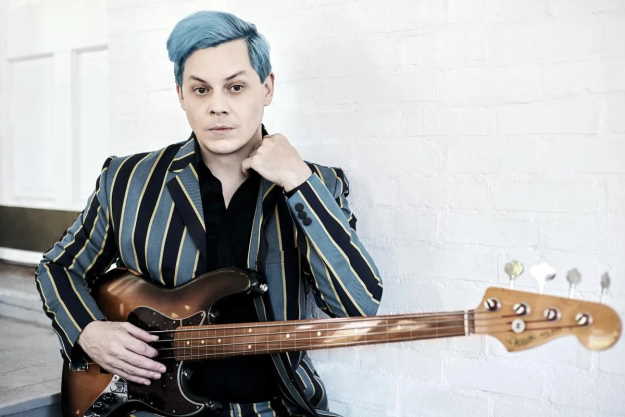
Photo by James Swanson |
"I actually thought about adding a bass player to the White Stripes for a long time. At first it didn't matter to us, because we just assumed that nobody would care about us or the kind of music we were making, so, whatever - we were just going to do what we wanted," Jack White recalls while sitting in his rehearsal studio in Nashville, Tennessee. "As we got more popular, we started to be tempted to have a bass player, but people were liking what we were doing, so we didn't want to change the formula and mess it up. Then, after a while, we would get insulted when people would mention it - like, 'How dare you think we need a bass player or another band member!'" White laughs.
As a guitar and drum duo, the White Stripes rose to remarkable fame and success with their garage-rock-meets-blues sound that relied on simple yet infinitely catchy riffs and an unapologetically stripped-down, low-fi sound. For Jack White, being such a high- to mid-frequency-driven songwriter whose music became iconic without a bass in sight, one surprising fact stands out: For his two solo albums, Fear of the Dawn and Entering Heaven Alive, the 46-year-old embraced the bass guitar and used it as one of his keys to writing.
White's recent infatuation with bass isn't much of a stretch, as long before the White Stripes sold millions of albums and became one of the most influential outfits of a generation, he grew up playing drums in the music-rich city of Detroit. Taking in a diverse palette of sounds crossing all genres, it was there that his appreciation for tight rhythm sections led to his awe of bass players who would influence him throughout his career.
"There were many, many songs that I'd hear as a kid where I wouldn't know who the bass player was, doing all these runs and playing such amazing parts. So I'd write down the name of the track and do some research. Of course, most times, with any Detroit music, it ended up being James Jamerson. At the same time, Paul McCartney and John Paul Jones would blow me away with how melodic and rhythmic they could be within their super-popular songs."
White has put that admiration for the bass into action on his two recent and vastly different albums as a solo artist. Fear of the Dawn, an inspired album that showcases a rejuvenated artist,and Entering Heaven Alive, a folk-influenced journey of introspection, exhibit two very different stylistic sides of White. But one thread that both records share is their focus on low frequencies and White's newfound love of writing on bass. Partially propelled by his recent acquisition of a fretless Fender Jaco Pastorius Signature Jazz Bass and also by his beloved '60s Hofner "violin bass," White jumps from gritty, fuzz-powered riffs to soulful grooves throughout the two albums, which were both written during the COVID lockdown.
Most important, White avoids the cliché of having the bass match the guitar riffs, no doubt because many of these songs were born on his 4-strings, including "Hi De Ho," "What's the Trick," "Taking Me Back," "Fear the Dawn," and the grooviest track of them all, "Shedding My Velvet." White's daughter Scarlett makes a surprise cameo and lays down the bass on "Into the Twilight," which has us hoping to hear more from her in the future. More than anything, when you think of Jack White, you think of timeless, catchy riffs that aren't trying to outsmart you or overcomplicate matters in taking away from the song's core of the melody and harmony. White sticks to that principle when he dons a bass, and we have to give it up to the man: He can definitely groove.
We hope White's penchant for low end isn't a momentary phase, but instead a permanent songwriting vehicle and a cornerstone of his untamed ideas to come. We were thrilled to learn how deeply passionate he is about the instrument that we call home, and even more inspired by how excited he was to sit down and discuss it. For a man who became a legendary songwriter without ever utilizing a bass, now he is making up for lost time.

Jack White. PhotoCredit: Paige Sara |
Have you always played bass, or is it something you picked up over the years?
I've always played bass, but I'd never written on it enough. I would write on bass here and there, but this time I wrote on it a lot. And, those ideas stuck. A handful of songs on these albums were written entirely on bass, and I played it on most of the others. It was good timing, because I went to the Fender factory in California to take a tour and talk to them about some ideas I had. I went to the bass section, where they had a bunch of necks hanging, and one of them said "Jaco" on it. I hadn't realized they made fretless necks with epoxy, like he played. I bought one from them, and I'm glad I did, because I wrote several things with it. It was nice to try to play a fretless bass and write with it, because it was much more difficult, and it gave me a nice challenge.
Did it take some time to get your intonation down on the fretless fingerboard?
Definitely. I wouldn't put what I did up against a tuner, but it got me to understand where the notes exist and all of the slight variations off them. It inspired me to work on different sliding techniques, and I tried to come up with some of my own. I've been enjoying playing fretless bass, and I'm hoping to take it on tour with me. I'm talking to Fender about making another one with different pickups that match the custom Fender Telecaster they're building for me - almost as a big brother version, but with a fretless neck. Since my last album I've been using three guitars designed by other guitarists, with signature models from Eddie Van Halen, Skunk Baxter, and St. Vincent. It was a good thing for me to do, because I love designing and creating my own things and customizing my guitars, which I've done for years. But this showed me what other players found interesting. The Jaco bass is great because it has a switch where you can bypass the pots straight to the output jack, and the difference is impressive. I want to put those on my guitars now.
What inspired you to write two very different records in such a short span?
It's safe to say that the lockdown and the time off from the road was very inspiring to me. I re-evaluated all of my relationships and how I relate to the world and myself as an artist, and it was great. That time period was a cleansing for me, and probably for a whole lot of other people, too.
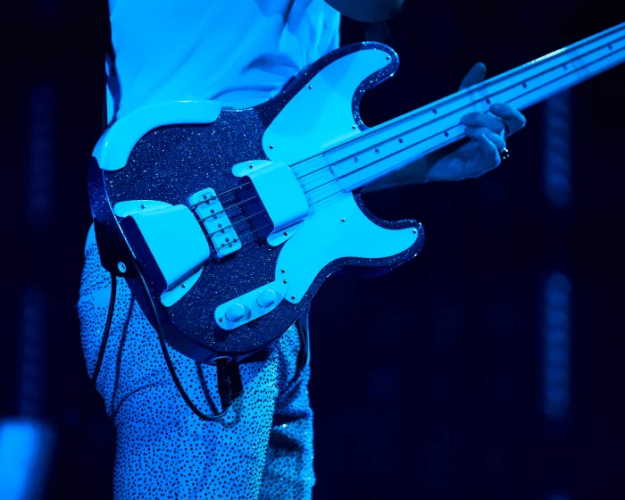
White's new custom Fender Fretless Telecaster Bass |
These songs are very bass-heavy. Where would bass come into the order of your writing process?
Generally, it was a mixed bag how I wrote each song, but "Hi De Ho" was written exclusively on bass. That main riff, "doom, doom, doom," came from me playing around on the bass one night. "What's the Trick" was written on fretless bass. "Taking Me Back" and "Fear the Dawn" started on bass, too. I had a bass going through a fuzz pedal and an octave pedal, and those began their life on bass and got transferred over to guitar. I used my early-'60s Hofner on a lot of their songs, which I just love because that thing's tone sounds like nothing else. I would A/B-test everything on different basses, and the Hofner would always win. Tonally, you get a lot of strength out of it because it's more midrangey than subby or bassy; I haven't played anything else like it. I like to hear the notes of the bass and not just mud hanging out underneath everything.
"Shedding My Velvet" has a nasty groove. You must have written that on bass.
I did, and it's good to hear that bass players appreciate that. I had a folk song that I sent to Eddie Vedder. I asked him what he thought about it to get a taste of where it might go, and he said it sounds like a song the Who did back in the '70s. So I checked it out, and sure enough, it did. Not only did the Who do it, but it felt like something that had been done several times, and was a little too standard of a folk progression. I wiped it away and started from scratch, and I picked up a bass, and it went from there. It came to life when I rewrote it on bass.
You get a great overdriven fuzz tone on songs like "Taking Me Back," "Fear of the Dawn," and "The White Raven." What did you use to cop that tone?
I really like the Hofner, and a low-octave pedal makes it even more powerful. You get the midrange and then the sub octave, and it makes such a thick sound. We have a new pedal that I helped design called the Triple Graph, which we sell through Third Man, and it's an octave up, an octave down, and in the middle is an intermittent cutoff switch. You can press all three of the buttons and have just the high and low octave and not the original signal. That can be super interesting on bass.
Your daughter Scarlett recorded bass on "Into the Twilight," which came out beautifully. Is she going to pursue a life of low end?
I don't know where she's headed or if she's going to pursue this, but she's a very good bass player. She has a '72 Thinline Telecaster Bass. It's the only time we've ever recorded with that thing. I caught her at a good moment, and I wanted to keep it. I would never push my kids into the life I've had - I'd rather them have another life [laughs]. She likes playing bass a lot, and she does it very well, so we'll see where she chooses to take it.
How did you capture your bass sound in the studio?
The Hofner is great through an amplifier, because you don't get all that gigantic muddiness, and it gets a lot of clarity through an amp. I used a DI, as well, but I'm not always a fan of DI with bass because it can sometimes sound kind of wimpy. You have to strengthen it with something else. If I used my old Jazz Bass, the DI was important because I'd want to get the clarity of the tone that the big amp isn't going to give you. The Hofner didn't need it much.
How would you describe your ideal tone?
The Paul McCartney on a Hofner attack on bass is my favorite tone. It has melody, and with his ability it just becomes a thing of its own. I dislike when I'm listening to a song and I can't tell which notes the bass is playing. You could always hear what John Paul Jones was doing; like on "How Many More Times," you hear every note so powerfully. Like McCartney on "Dear Prudence," that kind of visibility and clarity is everything for bass tone.
It sounds like the Hofner pulled a lot of weight on this record, with help from the Jaco Signature. Which other basses did you use?
For some songs I used a vintage '60s Jazz Bass that I bought years ago. I was lucky; I went to a guy who had five of them for sale, and I got to do something that you almost never get to do: I played each one and compared them all. I picked the best one, and I love that bass. The Hofner wins every time, though. If the studio is on fire, I'm grabbing the Hofner and running out with it!
How do you approach writing on bass differently from writing on guitar?
I'm glad I started music as a drummer as a kid. If I had picked anything else, I would be a way different musician, so I wouldn't change anything. Starting off as a drummer is very foundational, and it gives you the rhythm that you can apply to anything: piano, guitar, or bass. Even if you already play bass or guitar, figure out a way to get over and play some drums, and have that be part of your life. It helps with the construction of your music, your songwriting, and your overall feel and approach. For me, a similar thing can be said about the bass. When I write songs on bass instead of guitar, it has a whole different rhythm. It becomes funkier and more about the one and more about the kick drum. That changes my whole outlook as a writer.
You've played with some great drummers throughout your career.
I've been lucky to play with some of the most interesting drummers of the past 20 years, from Meg White (White Stripes) to Patrick Keeler (the Raconteurs) to Carla Azar to Daru Jones. Onstage, I play to the drummer, and it doesn't matter if there's one person up there or seven other people onstage; that's what I focus on. This time on tour, I'm going to be playing bass on a few tracks every night, and it'll be nice to lock in in that fashion.
That'll be a first for you. How do you feel about playing bass live?
I've been doing it in rehearsals, and I find that it's easier to play bass and sing in the sense that you're locked in and you can accentuate the vocals more when you're not holding chords or trying to switch three fingers into different positions. I'm holding down one finger, and it feels very natural. Bass is like a kick and a snare to me; it has that foundational principle. There's a song on the album called "Tree on Fire From Within" that has acoustic guitar on it, but that's really background noise; the song's whole focus is drum and bass. I'm interested in seeing what that will be like live.
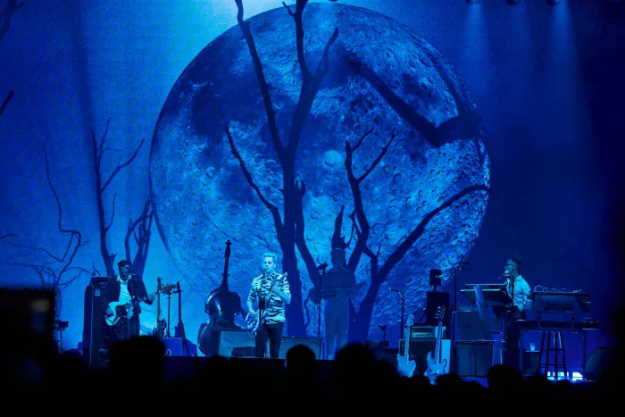
Live in Los Angeles, 2022 (Photo by David James Swanson) |
Do you have your bass rig picked out for the upcoming tour?
It's an Echolette bass amp, which is a German amp company, and I don't think I've ever seen anyone using them live. I hope this tour turns some people on to them. I'll have my bass go through a preamp pedal and then the Triple Graph pedal. So far I haven't dug deep into the Graph, but once I get out on the road, things might change and I might realize that I want to try a couple of different ideas with it.
How does your bass technique vary from your guitar technique?
I play bass with my fingers a lot of the time, and I always worry that my calluses aren't going to be in the right place, or I won't be able to handle those big strings for long, or I'll overplay and give myself blisters. But at the end of the day, it's okay. I string the Hofner with flatwounds, which gives it such a creamy tone, and those are friendly on the fingers. I like playing bass without a pick because you can sort of feel everything more and control the resonance of each note. That's a cool thing, coming from the world of a guitar player.
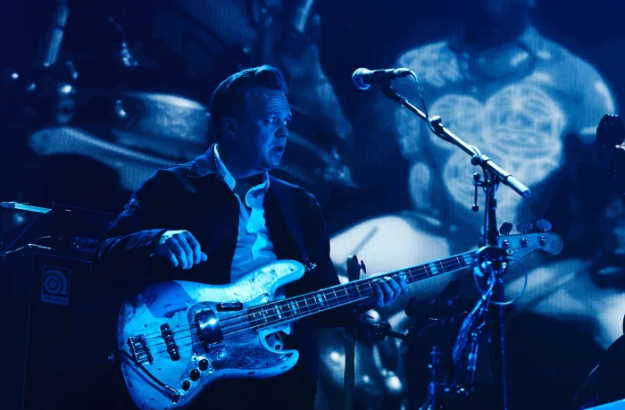
Dominic Davis performing live with White, 2022 (Photo by David James Swanson) |
You also had longtime collaborators Jack Lawrence and Dominic Davis record tracks on these albums. What is it that you love about their bass playing?
Jack is the best-kept secret in music. That guy is just a monster bass player. He played on one track on these new albums and he brought some really interesting stuff to it. It reminded me of why I like him so much and why I've been in two bands with him. I'm lucky to know him. I went to see his band, the Greenhorns. Talk about a rhythm section - they're still my favorite modern section, with him and Patrick Keeler. People should be hiring those guys left and right for albums. My other blessing is working with Dominic, who I've been playing with since I was 12 years old. It's amazing to have a friend for that long and still be making music together. He was there when I wrote my very first songs; he was in the room playing along with me. How crazy is that to still be making music together 35 or so years later?
How would you say Jack and Dominic differ as bass players?
They're totally different. Dominic is a great bandleader. He's good for me to have in my solo career, because I don't have set lists or plan out the shows or anything, so when I start a song he can immediately tell what the song is and let the rest of the band know what's going on and what's happening. He's like a computer with his memory. He's also got that wedding-band mentality where he can probably play any song you can think up. I don't have that at all. I can't sit and play you any Motown song that you shout out; that's not the kind of musician I am, and that's a great person to have in your platoon. He holds it down for me and keeps the train running.
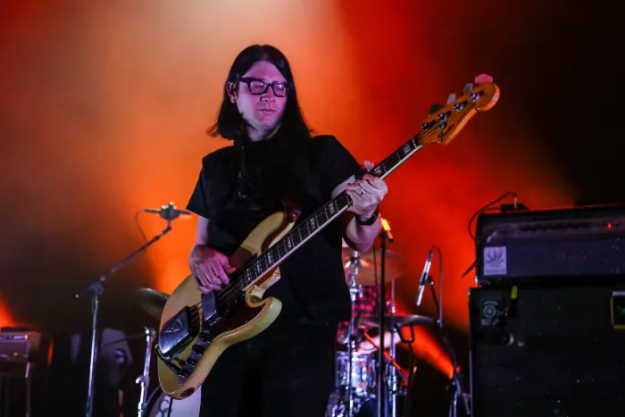
Jack Lawrence |
LJ (Jack Lawrence) is kind of a mystery man. I don't ever know what he's thinking or what he's doing. One time when we were playing a festival in Japan with the Raconteurs, he was playing the most amazing bass runs on a super-heavy, fast song. At one point, he went over to the side of the stage to tell the guitar tech something, and I thought there was a problem. He talked to him for a minute in the middle of playing this incredible bass part, and I couldn't believe he could have this conversation at the same time. I wondered what happened, so after the song, I went over as I was switching guitars. I asked what was wrong with LJ's bass rig, and he said, "Oh, nothing is wrong - LJ was just telling me about the new car he bought!"
Starting as a drummer, which rhythm sections inspired you?
I especially liked Led Zeppelin and Deep Purple's rhythm sections, because technically, it was all very hard, but it showed that the blues runs that the British bands might have been getting from American R&B and blues albums were very important in heavy rock. I have a soft spot for the rhythm sections of the Beatles and the Rolling Stones because of the simplified drumming. That enabled you to clearly hear the tones of McCartney and Bill Wyman, and it allowed you to feel the pocket when they were doing their bass runs. When the drummer is good, that's amazing, obviously, and I love that to death. But when the drummer stays in the pocket while the bass player is filling, you can get a lot out of that.
What was it like growing up as a musician in Detroit with all of that history around you?
It was wild. Detroit doesn't do that great of a job of showcasing their history. I didn't realize that until I came to Nashville, where you can't walk 15 feet without someone mentioning Nashville's music history. There are signs and murals on every wall, and statues all over the place. I want that for Detroit; I want Detroit to do that. From the Motown era to the Stooges to MC5 to the garage-rock era that I came out of, it goes on and on. Detroit has crazy DNA or something in the water. And it's so diverse; it's not just one style. So many types of music have come out of that city. It's a plethora of stuff to draw from, and I'm glad that I grew up in a time period that I did. If I had grown up in the '60s I might have missed a lot of that stuff or would have only focused on one aspect of it. I can draw from the things I like, from John Lee Hooker and Motown and the Stooges, and somehow a part of me is built up on that foundation.
Now that you're one of us as a bass player, do you ever wonder what the White Stripes would have sounded like with a bassist?
It's an interesting thought, for sure, but that band was exactly what it needed to be. I felt like we covered all of the ground sonically. When Meg would hit the kick drum, it was the same as when a bass player would hit an E note for one moment. It was being held down in the way that it was held down for the Doors with [Ray Manzarek's] left hand on the keys. I've seen two-piece bands who would do better with a bass player because the one wasn't being accentuated. Then I see two-piece bands who can truly pull it off. There's something about two guys playing cards, or three guys playing cards, but if you have six guys playing cards, all of a sudden everything changes. There's something about two or three that's special, and there's magic in the power trio - and you can't explain why it would be better in certain situations. A lot of people might not even understand the role of the bass if the guitarist and bassist are playing all of the same notes. It's good to be able to find a bass player who can complement what you're doing and feed off it, and also have another layer of creativity that people can explore. It didn't feel needed for me to play bass back then on that music, but it does now for this music. -BM
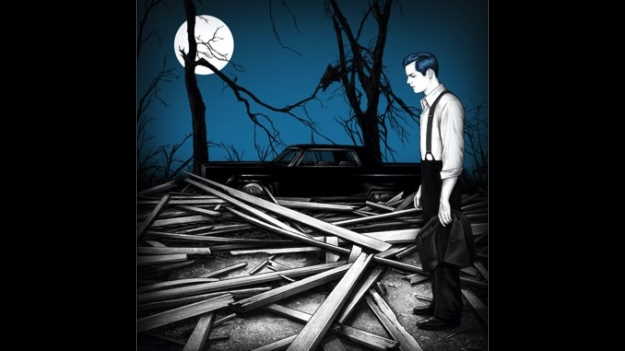
Jack White, 'Fear of the Dawn'. (Image credit: Third Man Records) |
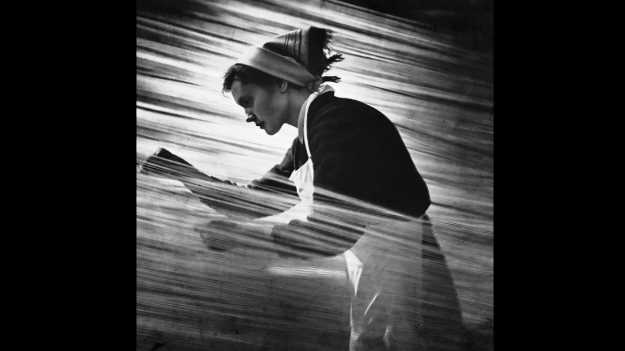
Jack White, 'Entering Heaven Alive'. (Image credit: Third Man Records) |
Hear Him On
Jack White, Fear of the Dawn [2022, Third Man], Entering Heaven Alive [2022, Third Man]
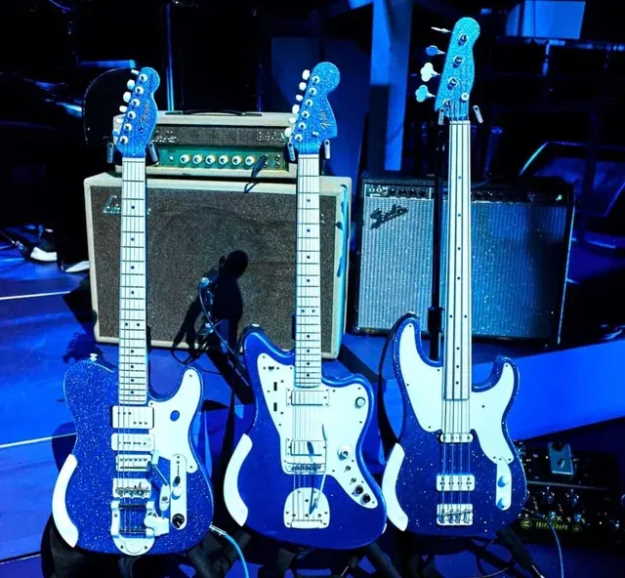
White's custom Fender tour collection |
Gear
Bass Fender Custom Fretless Telecaster Bass, Fender Jaco Pastorius Signature Jazz Bass, '60s Hofner 500/1, '60s Fender Jazz Bass
Rig Echolette Mk1, Echolette 212
Effects Coppersound Triplegraph
For more on Jack White: Click Here
Follow Jack White: Here
|